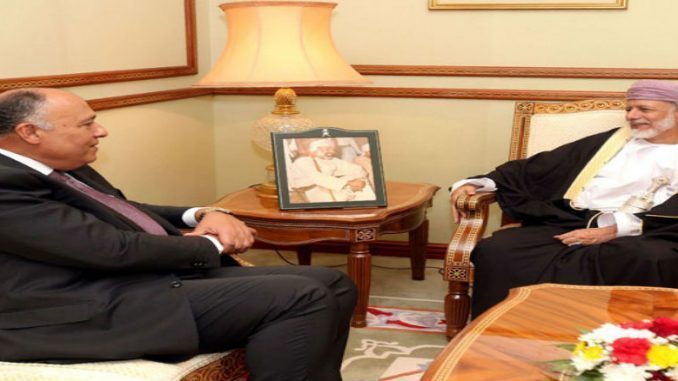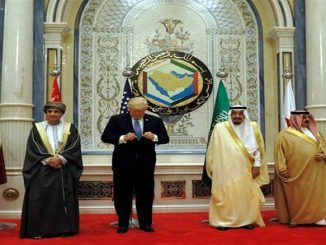
Egypt’s Foreign Minister Sameh Shoukry visited Oman to send a verbal message from Abdel Fattah Al Sisi of Egypt to Sultan Qaboos bin Said related to the bilateral relations between the two countries and means of supporting and enhancing them, as well as matters of common concern between the two sides.
FM Sameh Shoukry handed over the message to Sayyid Asa’ad bin Tariq Al Said, the personal representative of Sultan Qaboos.
According to a statement released by Egypt’s Foreign Ministry, the visit aims to strengthen the bilateral ties between the two countries and follow-up on the implementation of cooperation programs and projects between them.
In the meeting, Sameh Shoukry and Asa’ad bin Tariq discussed and exchanged their point of views towards many crises that face the region especially the Yemen crisis.
In addition, FM Sameh Shoukry met his Omani counterpart Yousef bin Alawi bin Abdullah in Oman’s capital Muscat.
During the meeting, Egypt’s Foreign Minister said that both Egypt and Oman adopt similar policies.
Shoukry stated that Egypt and Oman have historical relations that have always been marked by holding similar views.
He also added that two countries adopt similar policies that contribute to the strengthening of Arab stability and solidarity and work jointly in serving the interests of the two peoples.
In addition, the two ministers discussed Arab regional issues and challenges related to the situations in Syria, Yemen, and Iraq, as well as the fight against terrorism, according to the Oman News Agency.
In fact, Oman is one of the few Arab states which maintains good relations with Iran.Oman, which neighbors Yemen, has used its links with Tehran to mediate peace talks between the Iranian-backed Houthi militants and Yemen’s UN-recognized government of president Abdrabbuh Mansour Hadi.
The Yemeni Crisis
Many observers believe that the Yemeni crisis was on FM Sameh Shoukry’s top agenda during his visit to Muscat.
However, there are two scenarios regarding Egypt’s role in the Yemeni crisis.
The first scenario suggests that Egypt seeks to enter the Yemeni scene from the Iranian gate through Oman while a second scenario suggests that the visit would be a prelude from Egypt to support Saudi Arabia at least politically.
- The First Scenario: Egypt seeks to enter the Yemeni scene from the Iranian gate through Oman
Regarding the first point of view, there have been various indications of rapprochements recently between Egypt and Iran under the auspices of Russia.
In fact, there is no doubt that the Syrian crisis has brought Egypt and Tehran closer that Iranian officials praised Egypt for its policy towards Syria.
In this context, Hossein Amir Abdollahian, a senior adviser to the parliament speaker, praised Egypt for its “constructive and useful” positions on the Syrian crisis and campaign against terrorism last October, as reported by Tehran Times.
In a meeting with Yasser Othman, Amir Abdollahian said, “Iran and Egypt are two big and influential countries which can play a constructive role through mutual cooperation in the region to help soothe tensions.”
Othman also said that Iran plays an important role in the region and called for increased consultations between the two countries to ameliorate the volatile situation in the region, said Tehran Times.
Accordingly, the Yemeni crisis would be another meeting point between Egypt and Iran as Egypt would enter the Yemeni scene from the Iranian gate through Oman; especially that there were previous documents that showed that the three countries have smuggled weapons to the Houthis militants last December.
A British-based Conflict Armament Research (Car) found that weapons seized from Iranian-made dhows by Australian and French warships in the Arabian Sea matched similar weapons captured from Houthis in Yemen.
Moreover, Iran wasn’t the only country accused of being a gunrunner for Houthi militants in Yemen.
On September 16, Al-Hayat Saudi newspaper reported that Allies of Yemen’s president Abd-Rabbu Mansour Hadi in Marib, in the south of Yemen, found weapons bound for Iran-aligned Houthi forces on trucks with Omani license plates.
Although the Saudi newspaper said that is no evidence of any link to Omani authorities, who are according to Saudi Authorities, neutral in Yemen’s war, Oman foreign minister has denied in an official statement these accusations.
Following Middle East Eye, Oman has strongly denied claims that Iranian arms are being smuggled through its border with Yemen to Houthi rebels.
“This is baseless, traffickers were using unmonitored areas of the war-torn nation’s coast.” Oman’s foreign ministry said in a statement on its website, adding “There are no weapons passing through the sultanate’s territory” to Yemen.
Furthermore, The New Arab had accused the Egyptian navy in October of delivering hardware to the Houthi rebels during the past two months.
Quoted a senior Yemeni official, the Qatari newspaper said that Houthi rebels have received a dozen advanced military boats and other supplies from Egypt, through boats which were supplied by the Egyptian navy and to the commander of a military base in western Hodeida province.
“The transaction took place on an island off the coast of al-Luhayyah, in northern Hodeida province, and through an associate of former president Ali Abdullah Saleh,” the Yemeni official told The New Arab newspaper.
- The Second Scenario: A Prelude to Support the Saudi Kingdom Politically
In fact, the Yemeni crisis was among the other disputable issues between Egypt and Saudi Arabia.
The Kingdom thought that Al-Sisi regime will assist them militarily by sending ground troops to Yemen to pay back their favors.
However, al-Sisi ditched Saudi moves in Yemen as he did in Syria when he stood in favor of the Russian resolution in the UN Security Council last October.
At that time, Saudi Arabia, the major Gulf backer, described Egypt’s vote as a “painful” stance.
After the voting, the Saudi ambassador to the UN, Abduallah al-Mouallimi said, “It was painful that the Senegalese and Malaysian stance was closer to the Arab’s consensus than the Egyptian delegation.”
He also said that he feels pity for these countries that voted for the Russian resolution, stressing that his country will continue backing the Syrian people by all means.
Two days following the voting, Saudi state-owned oil company Aramco announced halting oil product supply to Egypt.
Regrading Yemen crisis, Egypt had promised to back Saudi Arabia with ground troops in Yemen if needed, but ultimately balked when the actual military operation started.
Egypt only has Air Force elements in Saudi Arabia, but it does not have any ground forces as unveiled by al-Sisi last August.
During the seven-hour meeting with the editors-in-chiefs of state-owned newspapers, al-Sisi said, “We have Air Force elements in Saudi Arabia, but we do not have any ground forces in any Arab country. All of our forces abroad work within the framework of the United Nations peacekeeping forces.”
Egypt’s air force has been participating in the Saudi-led military coalition against Houthi rebels in Yemen since the coalition was launched in March 2015, according to Al-Ahram (state-owned newspaper).
In fact, Saudi Arabia was disappointed by al-Sisi regime stances after it channeled billions of dollars to stabilize his military regime after he led a military coup against Egypt’s President Mohamed Morsi in 2013.
Accordingly, the second scenario suggests that Egypt’s FM visit to Muscat would be a prelude from al-Sisi regime to support Saudi Arabia at least politically as a step towards mending the relations between both countries.
In the end, the Egyptian movements would revive the Egyptian-Saudi relations or would be another setback to Saudi Arabia’s foreign policy in supporting al-Sisi military coup as there is a common trait of dictators – they are only loyal to their greed for power.



